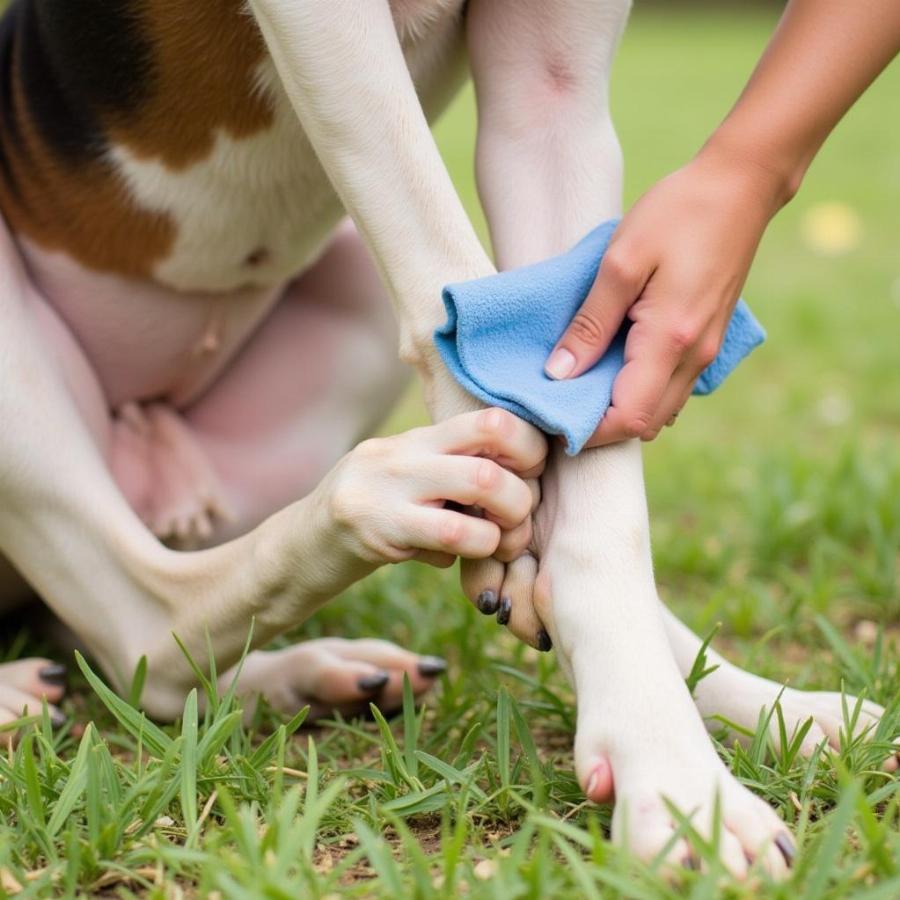Grass allergy in dogs is a common issue that can cause significant discomfort for your furry friend. It’s important to understand the signs, symptoms, and treatment options available to help your dog live a happier, itch-free life. This comprehensive guide will equip you with the knowledge to effectively manage grass allergies in your canine companion.
Understanding Grass Allergy in Dogs
Does your dog constantly lick, chew, and scratch at their skin after spending time outdoors? They might be suffering from a grass allergy. While often mistaken for other skin conditions, grass allergies manifest through a variety of symptoms. It’s not the grass itself that causes the allergic reaction, but rather the pollen and other proteins found on the blades of grass. These allergens trigger an immune response in susceptible dogs, leading to a cascade of uncomfortable symptoms.
Identifying the Symptoms of Grass Allergy
Recognizing the signs of a grass allergy is the first step towards effective management. Common symptoms include:
- Intense itching and scratching, especially on the paws, belly, and face.
- Red, inflamed skin.
- Excessive licking and chewing of affected areas.
- Hair loss in patches due to constant scratching.
- Sneezing and runny nose in some cases.
- Ear infections, especially if the dog frequently scratches its ears.
If you notice any of these symptoms in your dog, consult with a veterinarian to get a proper diagnosis and rule out other potential causes.
Managing Grass Allergy in Dogs: Effective Strategies
Once your veterinarian has confirmed a grass allergy, there are several management strategies to alleviate your dog’s discomfort.
Medication and Topical Treatments
Your vet might prescribe antihistamines, corticosteroids, or other medications to control the allergic reaction. Topical creams and shampoos can also soothe itchy skin and reduce inflammation. dog allergic reaction to grass provides more details on different medication options.
Limiting Exposure to Grass
One of the most effective ways to manage grass allergies is to minimize your dog’s contact with grass. Consider creating a designated potty area with gravel or paving stones. Wipe your dog’s paws and belly with a damp towel after walks to remove pollen.
Immunotherapy for Long-Term Relief
For chronic grass allergies, your vet might recommend immunotherapy, commonly known as allergy shots. This treatment involves gradually exposing your dog to small amounts of the allergen to desensitize their immune system over time. grass allergy dog delves deeper into immunotherapy as a long-term solution.
Preventing Grass Allergies in Dogs: Proactive Measures
While you can’t completely prevent grass allergies, certain proactive measures can minimize the risk and severity of reactions.
Maintaining a Healthy Skin Barrier
A strong skin barrier is crucial for protecting against allergens. Regular bathing with a hypoallergenic shampoo and providing a balanced diet rich in omega-3 fatty acids can help maintain skin health. best dog allergy chews can provide additional support for skin and coat health.
Regular Grooming
Frequent brushing removes pollen and other allergens from your dog’s coat, reducing exposure and irritation.
 Caring for a Dog with Allergies
Caring for a Dog with Allergies
Conclusion: Ensuring a Comfortable Life for Your Dog
Grass allergy in dogs can be challenging, but with proper management, your furry friend can enjoy an itch-free life. By understanding the symptoms, utilizing effective treatment strategies, and taking preventative measures, you can significantly improve your dog’s quality of life.
FAQs: Common Questions about Grass Allergies in Dogs
- Can grass allergies develop in older dogs? Yes, while allergies can develop at any age, they are more common in younger dogs.
- Are certain breeds more prone to grass allergies? Yes, some breeds, such as Terriers, Retrievers, and Setters, are considered more susceptible.
- Can grass allergies be cured? There is no cure for allergies, but they can be effectively managed.
- How long do allergy symptoms last? The duration of symptoms varies depending on the severity of the allergy and the level of exposure to the allergen.
- Are there any home remedies for grass allergies? While some home remedies might provide temporary relief, it’s always best to consult with a veterinarian for appropriate treatment.
- Can flea and tick medications worsen grass allergies? In some cases, certain flea and tick medications can exacerbate skin allergies. Discuss any potential interactions with your vet. flea chews for dogs might offer alternative options.
- Can eye drops help with eye irritation caused by allergies? Yes, your vet can prescribe specific eye drops to alleviate eye irritation. For more information on eye drops, check out dog allergy eye drops.
Beaut Dogs is your trusted resource for all things canine, providing expert advice and guidance on dog care, breeds, health, and more. Visit Beaut Dogs today to explore a world of information dedicated to helping you provide the best possible care for your beloved companion. When you need assistance, please contact Email: [email protected] to have Beaut Dogs answer in detail and accurately.